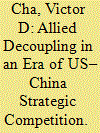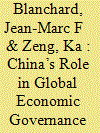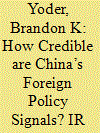|
|
|
Sort Order |
|
|
|
Items / Page
|
|
|
|
|
|
|
| Srl | Item |
| 1 |
ID:
175854


|
|
|
|
|
| Summary/Abstract |
The turn towards an openly competitive relationship between the United States and China today carries acute consequences for U.S. policy toward North Korea (Democratic People’s Republic of Korea or DPRK) and South Korea (Republic of Korea or ROK). The military and economic requirements of enacting such a policy of competition with China complicates U.S. policy with its ally South Korea, as it exacerbates three core dilemmas that the ROK contends with regarding China. These dilemmas compel choices for a U.S. ally that must increasingly become zero-sum in nature where Seoul must make choices that alienate its patron ally or its neighbor. This article draws out propositions for how changes in U.S.-China relations impacts strategy on both sides of the Korean peninsula. The primary finding is that changes in the independent variable (U.S.-China relations) have opposing impacts on South Korean and North Korean strategic thinking (dependent variable). What might be considered opportunities afforded by U.S.-China relations to South Korea are seen as threats by North Korea. Conversely opportunities created by U.S.-China relations for North Korea register as threats for South Korea.
|
|
|
|
|
|
|
|
|
|
|
|
|
|
|
|
| 2 |
ID:
175853


|
|
|
|
|
| Summary/Abstract |
Witnessing power shifts among major countries in the world, scholars and policymakers alike are confronted with crucial questions about the international institutional order: Do power shifts expedite the collapse of the order? Who are its major challengers, and why? This article tackles these issues, drawing on rationalist theories of international institutions that include both realist and neoliberal thinking. I analyse how the making of the international institutional order, along with its evolution, informs us of the sources of challenges to that order. Accordingly, I explain why the country most powerful in making the international institutional order—thus the apparent beneficiary of that order—ends up nursing so many grievances against it. I illustrate this thesis in the areas of collective security, international trade, and democracy promotion. This article contributes to important debates on global governance and raises policy implications for the rewriting of international rules.
|
|
|
|
|
|
|
|
|
|
|
|
|
|
|
|
| 3 |
ID:
175855


|
|
|
|
|
| Summary/Abstract |
A large proportion of debates about China’s impacts on global economic governance lack systematic empirical analysis. We engage the debate about if China is a revolutionary, revisionist, or status quo state through a deep dive into China’s behaviors with respect to Bilateral Investment Treaties (BITs). This research strategy is à propos because BITs represent the de facto regime governing foreign direct investment (FDI) globally, and China is the world’s second largest signatory of BITs. Drawing upon a database that we created using material on BITs available from the United Nations Conference on Trade and Development, we systematically examine the substantive and procedural provisions of China’s BITs from 2000 onward. Using a qualitative methodology discussed in-depth in our article, we also put China’s BIT practices in comparative perspective by comparing them against the BIT practices of Japan, a leading developed economy with BIT practices reflecting those of other established economies. Our multivariate analysis demonstrates China is not a revolutionary or dramatically revisionist player with respect to BITs. It champions positions that are neither hyper-conservative (state friendly) nor hyper-liberal (FDI friendly). To be more precise, China’s policies, especially with respect to substantive provisions, tend to be conservative, with, to some extent, some liberal aspects. Our analysis, then, indicates that commentators, businesspeople, and policymakers should be cautious about proffering claims that China is dramatically reshaping global economic governance. Aside from this important contribution to the debate, our work also expands knowledge about China’s BITs specifically and BITs generally, which does not reflect adequate attention to BITs from East Asian countries.
|
|
|
|
|
|
|
|
|
|
|
|
|
|
|
|
| 4 |
ID:
175856


|
|
|
|
|
| Summary/Abstract |
Scholars and policymakers currently lack systematic criteria for determining the credibility of China's foreign policy signals, which has produced widely divergent conclusions about its likely intentions. ‘China optimists’ view China’s cooperative signals as credible, while dismissing its noncooperative behaviors as unrepresentative of its broader preferences. Conversely, ‘China pessimists’ see China’s cooperative signals as non-credible misrepresentation and focus on China’s recent ‘assertive’ behavior. Drawing on theoretical scholarship on signaling and credibility in international relations, this article introduces general deductive criteria for assigning credibility to a rising state’s foreign policy signals. It then applies these criteria to evaluate the specific Chinese signals that optimists and pessimists have cited in support of their respective positions. The analysis finds that both optimists and pessimists have overlooked multiple conditions that have reduced the credibility of China’s cooperative and noncooperative foreign policy signals alike. This implies that far more uncertainty about China’s intentions is warranted than has been acknowledged on either side of the current debate.
|
|
|
|
|
|
|
|
|
|
|
|
|
|
|
|
| 5 |
ID:
175857


|
|
|
|
|
| Summary/Abstract |
Given the pivotal role of finance in interstate relations as a prominent source of international power, China–US financial competition, or even confrontation, could be more intense and devastating than trade conflict. It hence merits greater policy and academic attention and communication between the two states. This article takes stock of a triumvirate of Chinese views regarding China’s financial rise and potential China–US financial competition that has empirical and epistemological dimensions. Empirically, it signifies three major issue areas: Renminbi (RMB) strategies and dollar hegemony; the China–US financial imbalance and debt relations; and US dominance of global financial governance and ‘Zhongguo Fangan’—Chinese Solutions. RMB strategies to break dollar hegemony include a further three areas: International Monetary System reform; RMB internationalisation; and financial opening-up. Epistemologically, the empirical analyses present a triumvirate of embedded and interweaved angles: normative and universal; technical and micro level; and power and nationalist. Based on a triumvirate of perspectives, it argues that China’s financial rise is variously limited in relevant fields, and that China–US financial competition also varies according to different issue areas associated with different financial powers, and thus calls for a reductionist, field-specific, and pluralistic approach to managing China–US financial competition.
|
|
|
|
|
|
|
|
|
|
|
|
|
|
|
|
|
|
|
|
|